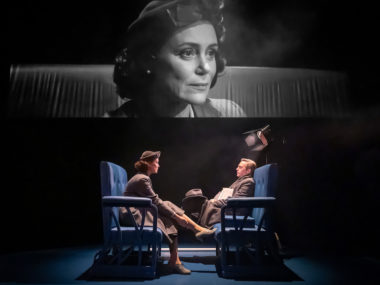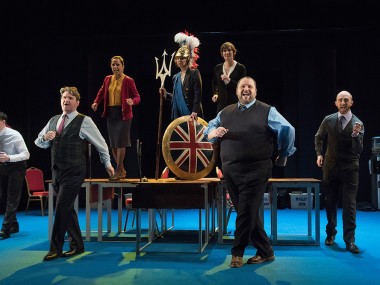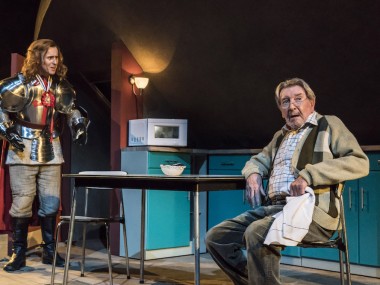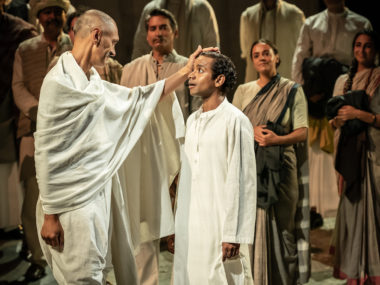Nye, National Theatre
Saturday 9th March 2024
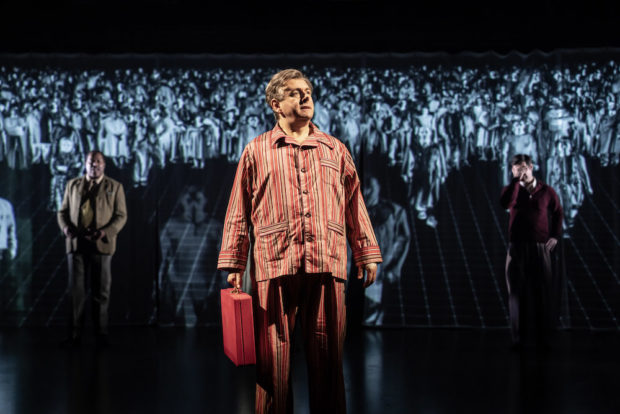
For me, this is the most emotional show on the London stage. Why’s that? Because it’s about Nye Bevan, who as Minister of Health in the postwar socialist Labour government set up the National Health Service (NHS). All my life, the NHS has looked after me, saved me during medical emergencies and helped keep me and my family well. It did the same with my parents, and with my friends. And not only for us — without doubt, next to the monarchy, it is the most treasured national institution, a central part of our British identity. Bevan was Welsh so it’s fitting that this tribute to his life and achievements, written by Tim Price, is a co-production between the National Theatre and Wales Millennium Centre, and features superstar Michael Sheen.
Staged in the Olivier Theatre, the National’s great main auditorium, at a time when the NHS is suffering massively from the effects of some 14 years of neglect by successive Conservative governments, Nye is very timely and very much a state-of-the-nation drama. Directed by Rufus Norris, the National’s artistic director, this is a theatre event that feels like a contribution to the current Labour Party’s election campaign. Unlike Lucy Kirkwood’s equally strong The Human Body, it is a memory play whose documentary content is enlivened by satirical and surreal theatrical effects.
It begins with Aneurin “Nye” Bevan (Sheen) waking up after a stomach operation at the NHS Royal Free Hospital in Hampstead in 1960. In considerable pain, he is given morphine and the play takes the form of his drug-tinted memories of his life and career. So we witness his Edwardian childhood in Tredegar on the South Wales coalfield. After an elementary education, he followed his father into the mines, working there and organizing workers in their fight for better wages and conditions. When the mine owners sacked these activists, they chose the twin routes of self-education and infiltration of local bodies like the council to continue their struggle.
Elected MP for Ebbw Vale in 1929, Nye married socialist MP Jennie Lee in 1934, opposed the wartime leadership of Winston Churchill, and was given the health ministry by PM Clement Attlee after Labour’s landslide victory in the 1945 election. After a long battle with both deputy Labour leader Herbert Morrison and the majority of the medical profession, he finally succeeded, against almost impossible odds, in setting up the NHS, free at the point of need, in 1948. Price covers all of these main life events generously, although of necessity missing out some of his subject’s contradictions: there’s no mention of Nye’s early support of British fascist Oswald Mosley nor his vigorous campaign against British rearmament against Hitler in the 1930s. Although the play is not a hagiography, it is deeply sympathetic to its hero.
Price focuses a lot of the Welsh firebrand’s psychology on his relationship with his father, David, and there are two scenes in which Nye’s sister Arianwen criticizes him for neglecting their father as he lies dying of coal workers’ pneumoconiosis. Nye, of course, argues that he has more important political work, and this tension between private and public is a central theme. Flashbacks to school involve a cartoon-like confrontation between Nye as a child with a stammer and a horrific school master wielding a huge cane. Another flashback takes us to the local library where Nye searches for synonyms of words that make his stammer worse.
As Nye develops into an activist we learn more about his relationship with Lee, in an apparently open marriage in which both had affairs, although not enough about Archie Lush, his oldest friend, who is at his deathbed along with Lee. There’s a lot of fun, and much laughter, in Nye’s fights with local mine owners, Tory politicians and especially Churchill, and the climactic confrontation with the doctors is highly emotional, and Price offers a neat contrast between medical big shots and the sympathetic nurses caring for the dying man. If the story arc is baggy and often either too superficial or too weighed down with detail, by the end there is a distinct feeling that we are witnessing a moving portrait of a man who is central to our national story.
Norris’s production is likewise a very mixed bag: Sheen is on stage for the entire two hours and 40 minutes, grey-haired and dressed in reddish striped pyjamas, giving a tremendously agile and compelling performance, perfectly embodying Nye’s childhood as well as his later years. His representation of Nye’s stammer is detailed and empathetic, and his fury at injustice is often palpable; by the end, on the night I saw the show, many in the audience were in tears. Around his rather surreal morphine-induced time travelling, the show has a vividly colourful feel of populistic theatre, with sharp images and grand gestures entirely suited to the venue and the play’s themes.
In a show dominated by Sheen’s charismatic stage presence, and memorably designed by Vicki Mortimer who uses huge green curtains instantly recognizable as NHS hospital furnishings to good effect, it is easy to overlook some of the long evening’s more disagreeable aspects. The script could have been much tighter (dramaturg Stewart Pringle where were you?) and the dancing could have been smoother (choreographers Steven Hoggett and Jess Williams where were you?), but the video sequences — especially the hideous close-ups of reactionary doctors — were excellent (thank you Jon Driscoll). I personally didn’t enjoy the banal song and movement routines (sorry Norris).
Although Sheen holds the stage, commanding our attention and our interest, Norris’s other cast members contribute to the fun: Sharon Small’s Lee has dignity and passion, while Stephanie Jacob’s Attlee and Tony Jayawardena’s Churchill mix comedy with a cynical knowledge of the mechanics of power. Archie (Roger Evans) hasn’t got enough of a part to really shine, and the same is sadly true of Small. I also rather like Jon Furlong as Morrison and Kezrena James as Arianwen and the nurse. The programme lists an enormous amount of other actors and creatives, who all contribute to a show which, despite being reminiscent of Dennis Potter’s The Singing Detective and Danny Boyle’s 2012 Olympics opening ceremony, is clearly an epic for our times. It is not only big, but also big hearted. And very moving.
This review first appeared on The Theatre Times

